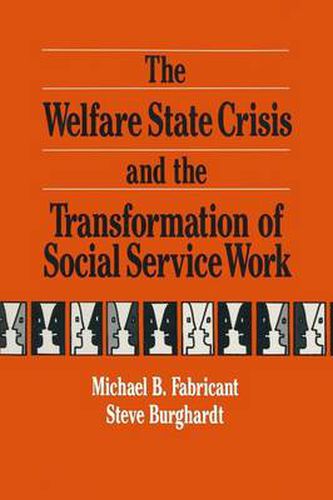Readings Newsletter
Become a Readings Member to make your shopping experience even easier.
Sign in or sign up for free!
You’re not far away from qualifying for FREE standard shipping within Australia
You’ve qualified for FREE standard shipping within Australia
The cart is loading…






This book has emerged in response to social service workers’ vivid descriptions of changes in the practice of their craft during the past 15 years and to the scanty literature that addressed their concerns. Few works have attempted to explore the interplay between the recent broader changes affecting the welfare state (fiscal crisis, cost containment, privatization, etc) and the restructuring of social service work. Yet, it is clear that the fiscal decisions of the 1980s profoundly affected both the context and content of social service practice. The Welfare State Crisis and the Transformation of Social Service Work explores how these larger forces have created significant changes for the line practitioner. The greater push for caseload volume in the face of resource scarcity is redefining service encounters in ways that are more likely to meet the fiscal needs of the agency rather than the service needs of clients and the professional concerns of the worker. In short, the fiscal crisis of the past two decades has placed the enterprise of social services at risk. After empirically documenting the seriousness of the risk, The Welfare State Crisis and the Transformation of Social Service Work concludes with an exploration of new social service practice strategies that have the potential to integrate the individual, organization, communal, and social changes necessary for effective service interventions.
$9.00 standard shipping within Australia
FREE standard shipping within Australia for orders over $100.00
Express & International shipping calculated at checkout
This book has emerged in response to social service workers’ vivid descriptions of changes in the practice of their craft during the past 15 years and to the scanty literature that addressed their concerns. Few works have attempted to explore the interplay between the recent broader changes affecting the welfare state (fiscal crisis, cost containment, privatization, etc) and the restructuring of social service work. Yet, it is clear that the fiscal decisions of the 1980s profoundly affected both the context and content of social service practice. The Welfare State Crisis and the Transformation of Social Service Work explores how these larger forces have created significant changes for the line practitioner. The greater push for caseload volume in the face of resource scarcity is redefining service encounters in ways that are more likely to meet the fiscal needs of the agency rather than the service needs of clients and the professional concerns of the worker. In short, the fiscal crisis of the past two decades has placed the enterprise of social services at risk. After empirically documenting the seriousness of the risk, The Welfare State Crisis and the Transformation of Social Service Work concludes with an exploration of new social service practice strategies that have the potential to integrate the individual, organization, communal, and social changes necessary for effective service interventions.